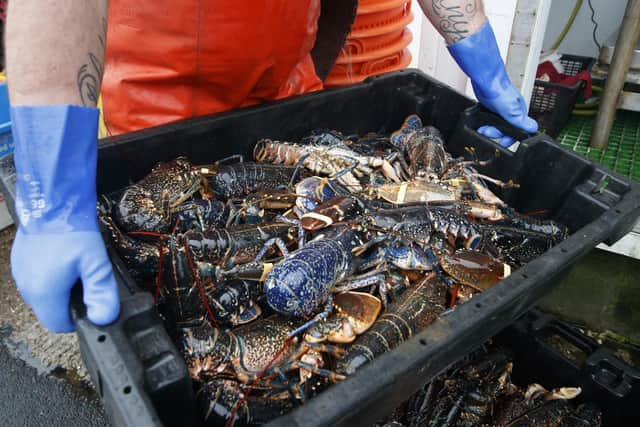Post-Brexit delays on fishing exports are more than just 'teething problems', MPs are told
Since the UK left the EU many fishers have faced problems in exporting to the bloc due to catch certificates, health checks and customs declarations which delayed deliveries and caused them to be rejected by EU buyers.
The Government has launched a £23m fund to compensate those facing problems and Boris Johnson described the issues as “teething problems” made worse by coronavirus.
Advertisement
Hide AdAdvertisement
Hide AdBut MPs on the Environment, Food and Rural Affairs Committee committee heard from and Martyn Youell, Senior Manager of Fisheries and Quota at fishing firm Waterdance, said he took issue with the branding of delays.


“We thought [that] was a particularly poor choice of words given that what we’ve found really is that the difficulties in exporting prodigy and indeed in producing product by fishing companies appear to be, in the large majority, systematic issues of trade under the agreement that’s been reached to date,” he said.
“So whilst some things have settled down, some obvious issues, then we feel that we remain with at least 80 per cent of the trading difficulties that have been encountered.”
And he added that “without some real political action to change the terms of trade” this would not be rectified.
Advertisement
Hide AdAdvertisement
Hide Ad“We should be aspiring to have the closest trading relationship with the EU of any nation, given our shared history, yet we’re miles behind a lot of other nations in terms of the way we can trade, in terms of some of the details, so they’re not teething problems for us.”
Mr Youell said the exporting system still being mainly paper-based was causing many issues, and cited one example of 71 pieces of paper being needed for one lorry of fish.
While Donna Fordyce, Chief Executive of industry organisation Seafood Scotland said the new system did not allow for the quick turnaround needed in the industry to guarantee fresh fish, and she warned: “The reputational risk of the UK is getting lost day by day and we need to rebuild that.”
Sarah Horsfall, from the Shellfish Association of Great Britain, said for their members it was not just about freshness but because often live product was transported, delays meant they would arrive dead.
Advertisement
Hide AdAdvertisement
Hide Ad“If we’re delayed, for example for four hours, that can mean that the product actually misses the market that day in France or in Spain and has to wait until the next day, which can have very considerable impacts on the mortality rates of the product.”
She said the paperwork needed was “extremely excessive”, and cost between £400 to £600 per consignment which she was concerned would hit smaller producers particularly hard.
“There were very difficult teething troubles to begin with but even so, as the others have said, we’re left with a system which is unwieldy and very difficult.”
There is also an additional issue with shellfish as the EU confirmed a temporary ban on mussels, clams, scallops, and cockles from the UK would be made permanent as they were deemed to come from polluted waters.
Advertisement
Hide AdAdvertisement
Hide AdWhile previously a purification process could be carried out anywhere in the bloc, as the UK was part of the EU, this must now be done before leaving the country and the resources are not available to do so.
Mr Youell said there was “a lot of ill feeling, to put it frankly, about the deal that was reached” and said the “highly aspirational position of the UK fishing sector in particular that those going out and catching was that there would be more to catch principally, and that there would be greater protection of inshore waters from visiting vessels, and much of that didn’t materialise”.
While Ms Horsfall warned of the long term prospects for the industry.
She said: “We’ve already seen a couple of companies shut their doors and say it’s not viable for us anymore in the shellfish sector.”
Advertisement
Hide AdAdvertisement
Hide AdOne of those firms is 60-year-old Bridlington business Baron Shellfish.
Sam Baron, who set up the firm in East Yorkshire with his father, told the Guardian last month: “It’s the extra costs and uncertainty. We have to fill in new health notes, and there is a lot of new paperwork, including the catch certificates. Every time you put lobsters on transport, if anything in the paperwork is wrong, you have lost everything.
“It is all Brexit-related – the extra costs, extra paperwork and the extra gamble – and it is down to the government and the EU. Every time you send out transport with lobster, it is like playing Russian roulette with five bullets in your gun.”
Ms Horsfall added: “It’s just been a perfect storm, hasn’t it? Covid, food services shut, and Brexit, you just couldn’t have written it any worse if you’d wanted to for the industry.”